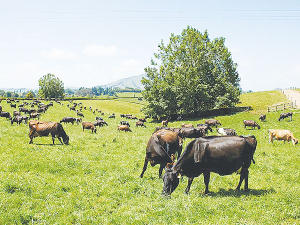Leptospirosis (lepto) is a disease caused by bacteria that can be spread from animal to human, otherwise known as a zoonotic disease.
The impact lepto can have on farm is devastating, with severe flu symptoms in humans and in some cases debilitating illness requiring hospitalisation. A recent survey conducted by Massey University showed that half of those affected were still experiencing symptoms a staggering eight months after diagnosis.
Leptospirosis is contracted most through exposure to the urine of infected animals, either through direct contact or via contaminated water. The bacteria enter through cuts or grazes on our skin, or through the mucous membranes of our eyes, nose and mouth.
There are different types of lepto, with cows often showing no clinical signs. This means that working with dairy cows can pose a significant risk for contracting lepto, so preventing exposure is vital.
Since the 1970s, the industry has had access to highly effective cattle vaccines, which have reduced the rate of human infections dramatically. Unfortunately, in recent years there have been cases of lepto in farmers and staff (including teat sealing technicians) working on vaccinated farms, many of which are thought to be due to a newly discovered strain of lepto within dairy herds. This new strain, known as Pacifica, wasn’t covered by the traditional dairy cattle lepto vaccines. Recent research suggests Pacifica could be present in almost three quarters of dairy herds nationwide.
A new vaccine, Lepto 4-WayTM, has recently been developed to provide protection against the emergence of Pacifica as well as the 3 strains (Hardjo, Pomona & Copenhageni) previously covered by your traditional vaccines. Upgrading to Lepto 4-WayTM will likely mean a change to current lepto vaccination schedule for 2023/2024 - your vet will discuss this with you.
While vaccination is an integral part of lepto management plan, strict health and safety on farm remains paramount to protect the farmer and his team.
“You should always stand clear of urinating cows, effluent spraying, cover up any cuts, and avoid eating, drinking or smoking/vaping in the pit. Rats and mice can carry other strains of lepto, so good pest control and avoiding possible contact with rodent urine is also important.
“Because lepto survives well in water, care should be taken around surface water and flooding after rain events - effluent ponds and spreaders can also be a risk. And because lepto can be treated with antibiotics you should always see a doctor as soon as possible if you suspect you have been infected.
“A case of lepto could have a huge impact on your team at a time you can least afford it.
“Prevention is critical, so staff education and upgrading your vaccine to Lepto 4-WayTM means you have done all you can to ensure the health and safety of you, your family and anyone who works on your farm.”
Article supplied by Virbac. Lepto 4-WayTM is a Restricted Veterinary Medicine. Available only under Veterinary Authorisation. Registered pursuant to the ACVM Act 1997, No. A012030.











